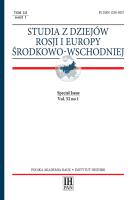The Construction of the Catholic Church in Nikolsk-Ussuriysky (Ussuriysk) in the Light of the Russian State Historical Archive of the Far East in Vladivostok
The Construction of the Catholic Church in Nikolsk-Ussuriysky (Ussuriysk) in the Light of the Russian State Historical Archive of the Far East in Vladivostok
Author(s): Przemysław AdamczewskiSubject(s): Local History / Microhistory, Pre-WW I & WW I (1900 -1919), Interwar Period (1920 - 1939)
Published by: Instytut Historii im. Tadeusza Manteuffla Polskiej Akademii Nauk
Keywords: Poles in Russia; Ussuriysk; Far East; Catholicism in Russia
Summary/Abstract: The article presents documents pertaining to the construction of a Catholic church at Ussuriysk, kept in the Russian State Historical Archive of the Far East in Vladivostok. The documents span the period between 1912 and 1921. They reveal that the Municipal Duma of Ussuriysk was in favour of the construction of a Catholic church in the town; this could be concluded from the fact that they gave free of charge a lot of land to the community of Catholics for that purpose. But the church was built on the lot belonging to a local entrepreneur, a certain Feliks Steckiewicz, for it was more suited to the needs of the Catholics due to its central location in the town. Initially Steckiewicz declared his intention to give the land to the Catholic parish. And because he was held in high esteem by the local community, he was put at the lead of a committee for the construction of the church. This made it possible for him to spent money collected by the faithful without any control. A conflict within the committee started when its members demanded financial reports. Steckiewicz never presented a financial statement; in addition, he withdrew his donation of land and demanded that the Catholic parish paid him for the church building constructed on his lot. Archival documents disprove the thesis, popular in the literature on the subject, that Steckiewicz’s actions were motivated by his fear of a growing strength of the Bolsheviks in Primorsky Krai and a possibility of nationalisation. The reasons for his actions were more mundane – his character that made it impossible for him to reach an agreement with the committee, and financial matters. This seems all the more probable in the light of testimonies of witnesses in court. They emphasised that Steckiewicz withdrew his donation of land to the church only after the committee requested financial reports and tallies of his expenses. It seems, therefore, that the local Polish community quarrelled not for political reasons, but financial matters related to the construction of a church.
Journal: Studia z Dziejów Rosji i Europy Środkowo-Wschodniej
- Issue Year: 52/2017
- Issue No: 1
- Page Range: 33-53
- Page Count: 21
- Language: English, Russian

